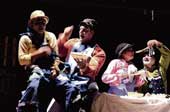 |
| Moments from C for Clown (above) and Ek Kadam Aage (below), staged at GD Birla Sabhagar. Pictures by Aranya Sen |
 |
As the Odeon Festival?s brand equity grows, it should prepare to answer questions about its equitability. On the plus side, it continues with the policy of diversification introduced last year, whereby alternative forms (street theatre, mime, puppetry, songs) find a welcome space. Even better this year, it went suburban, organising shows in Howrah and Barrackpore.
Yet its claim to showcase ?the best in Indian theatre? sounds hollow this year, as both imported productions came from Mumbai. Over the last three editions, it has sourced four plays from there ? none of them exceptional ? and one each from Delhi and Chennai (both outstanding). Not just that, the Mumbai shows this time were not even new, both having premiered in the previous decade. What makes Odeon think that the best Indian theatre must originate from Mumbai? And that there are no good new plays, justifying the choice of old ones?
The booklet contains a dead giveaway. According to sponsors Hutch, Ek Kadam Aage ?will comprise our Hindi offering? and C for Clown ?our English offering?. So this constitutes Indian theatre, ?spanning diverse languages?? If this indeed forms the selection quota, then Odeon deserves a jarring wakeup call on charges of linguistic discrimination.
Cinematograph?s C for Clown, about the lives and loves of circus jokers, felt the absence of key cast member Joy Fernandes (engaged in Verona on Tim Supple?s Midsummer Night?s Dream). The director Rajat Kapoor himself stood in, but could only come off second-best in the part of the clown with all brawn and no brain, which Fernandes relished and put his bulk to suitable use.
The four others did their best to hold our attention and achieved some highs. On stage, for instance, the episode where they react to newspaper reviews of their abilities ? obviously inspired by Kapoor?s earlier career as a theatre critic ? and one of them consequently reiterates his recurrent decision to commit suicide, makes for merry entertainment.
Collectively improvised by the team, C for Clown must constantly re-energise the sense of improvisation each time they perform, which becomes one of the toughest things to simulate when the entire act has become second nature after so many shows. A distinct dragging occurred, best resolved by chopping the duration to 90 minutes without an interval.
The same applies to Ansh?s Ek Kadam Aage, which feebly attempts some spontaneous audience participation too. Written and directed by Makrand Deshpande, the partly autobiographical script does not have enough to defend its length of over two hours. As it is, it sounds derivative, a kind of the Sandman meets Waiting for Godot (the Sandman, a DC comics creation, intervenes in one?s dreams). Deshpande?s Dream Man appears in the sleep of two roommates hoping to hit the big time in Mumbai?s showbiz dreamland, and then takes the shape of assorted plebeians whom they deal with daily: milkman, postman, tiffinbai, and so on.
Because this sequence goes on endlessly, it tires us, despite the altruistic message of treating ordinary folk with respect. Therefore the entrance of Lady Luck as an Afghan militia chief?s daughter offering an acting job comes as much-needed relief.
Although Deshpande?s obsession with Dream Man dates to 1992 when he founded Ansh with his play titled Dream Man, he acts too lackadaisically in the part, confusing and boring us in his crucial first scene.
However, Anil Yadav as the intellectually-deficient wannabe hero from Haryana is a name to watch out for, complemented by Amit Mistry as his friend, an aspiring singer from Gujarat. Teddy Maurya?s set expresses the urban clutter that necessitates dreams.
Local street theatre was represented by Jhalapala, who work with children and staged two short plays in the open. Kids enjoyed themselves in Abol Tabol directed by Santanil Ganguly, though it is very difficult to theatricalise Sukumar Ray?s fantastic creatures. Three older girls enacted Badal Sircar?s simple Bhul Rasta directed by Anshuman Das, about a prince who loses his way and becomes a woodcutter, growing more humane in the process. Bolstered by their prior training in Jhalapala, Sarbani Saha, Moushree Ganguly and Shrabani Saha sing, dance and narrate in a fluent mix of Hindi and Bengali.











